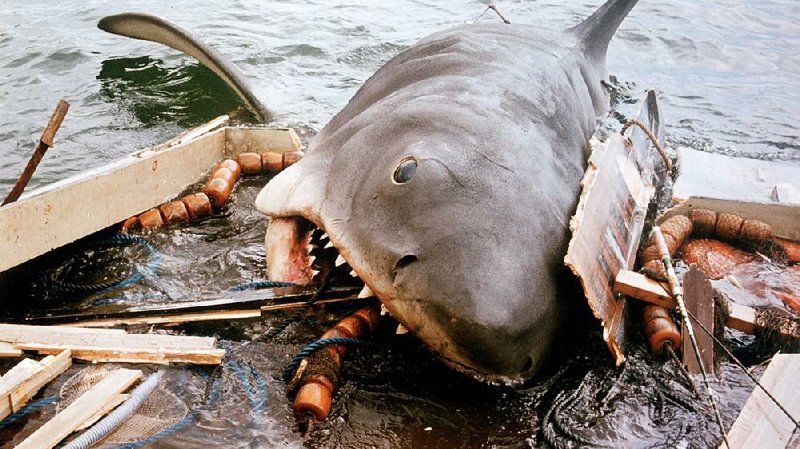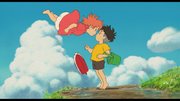Sometime in the summer of 1975 when I was 9, my family and I went camping in the Catskills with my New York cousins. They were everything we were not: cosmopolitan, streetwise and well-versed in the ways of humankind (by contrast, my sister and I, raised as we were in the flat farm country of upstate New York surrounded by books and animals, were probably closer to Truffaut's Wild Child).
For reasons no one can remember, one night during this weekend our parents decided we should see a movie in some nearby theater. My cousin Big Tony, the patriarch of the clan, chose the film.
What we saw haunted me for decades. Eventually, all I could remember were two distinct elements: a private investigator or something skulking around a shipyard, and the hero being captured and tortured with needles and drugs by an exceptionally cruel woman. Clearly, I couldn't follow the story, but I knew enough to be terrified of the chaos, disharmony and suffering the film depicted and it shook me to the core. That night, awake in my tent, I shuddered and (likely) sobbed, thoroughly discombobulated by what I had seen. Decades later, I was still trying to determine which film we had seen that night, combing through release dates of detective films from the era, trying to scrabble together any sort of memory beyond shipyards and needles.
My daughter turned 10 in December. This meant, as I had been promising her for years, on the first day of summer this year, she would finally be allowed to watch Jaws. She'd been near-obsessional about it -- largely, I assume, because of the framed movie poster I have down in our basement -- since she was 5. I had to cut a deal with her or else suffer being asked to see it in the endless repetition that only children can summon the strength to muster.
After being subjected to a film I was in no way emotionally prepared for, you might think I was protecting her emotional psyche from such a truly unsettling and terrifying film as Jaws, but that's only partly right. The other reason I had her wait was because I didn't want her to see that particular classic -- one of my favorites -- until she was old enough to appreciate it properly.
Keeping all that in mind, I thought it might be worthwhile to break down my carefully constructed cinema plan for my daughter, with my hoped-for response and her actual reaction, along with the master plan for the next five years, until she's old enough to shoo me away and discover her own cinematic pantheon.
By order of age (approximate):
Age: 2-4
Film(s): Wallace & Gromit, Finding Nemo, YouTube clips of movie scenes
One- sentence synopsis: I want her to enjoy all the pretty pictures.
Lesson(s): Movies are fun! Look, it's a narrative arc! Yay, movies!
Anticipated response: Giggling, snuggling, rapt attention to screen.
Actual response: Drooling, kicking, jumping all over the couch. Occasional watching. Sometimes things went better than anticipated -- she really loved A Close Shave, mostly because of the sheep -- but often her attention span was predictably limited. The YouTube clips proved a good way to ease her into more complicated material without overwhelming her. We spent most of a summer watching the same clips from Snow White and Jurassic Park over and over.
Age: 4-6
Film(s): Toy Story saga, The Sound of Music, The Lion King
One-sentence synopsis: Let's dig into this a little bit, shall we?
Lesson(s): Things can be sad, but then they can be happy again.
Anticipated response: Excitement, then sobbing, followed by cheers.
Actual response: Devastated by the sad parts; inconsolable about Mufasa. Eventually, she started to come around to the idea that something could be sad and happy simultaneously -- a bloody, necessary skill in this world -- and that people could halt nearly anything evil by suddenly stopping and singing about it. As a nonmusical sort of fellow, this particular lesson was more than a little problematic for me.
Age: 7-8
Film(s): Ratatouille, Star Wars, Ponyo, The Adventures of Tintin, Tangled
One-sentence synopsis: There are more things in heaven and earth, Horatio.
Lesson(s): Stories, like great chefs, can come from anywhere and lead you all over the world and beyond.
Anticipated response: Amazement, wonder, a sudden interest in geography and globes. A love of light sabers and the Millennium Falcon.
Actual response: Pretty close, though before I could stop her, she had watched the other, loathsome entries in the Star Wars saga (in my house, the only SW movies that exist are the original and Empire, and to a much lesser degree, The Force Awakens), which meant she technically knew more about the joint than I did. She always loved Ratatouille (a house favorite), Ponyo was just weird enough to really pique her interest and Tangled was the first film she actually saw in a theater, which turned out to be a decent choice. I had read through all the Tintin books, so she was fully prepared for Spielberg's sell-out adaptation. However, the complicated plotting of Star Wars left her befuddled, and required me to pause the film approximately every four minutes to explain what had just happened and why.
Age: 9
Film(s): Goonies, Raiders of the Lost Ark, The Princess Bride, E.T. the Extra-Terrestrial, Hoosiers
One-sentence synopsis: The '80s were a fun, fun time for kids' movies.
Lesson(s): Everything was better in my childhood? Otherwise, maybe the idea that action mixed with a wry sense of humor was an incredibly winning formula (for a more recent example, see Guardians of the Galaxy).
Anticipated response: Delight, knowing giggles, goosebumps.
Actual response: I had never actually seen Goonies, as I was past the age-point when it was released, and I saw that I really hadn't missed terribly much. Raiders remains spectacular and apparently impossible to re-create in each of its subsequent sequels (as much as she demanded to see Temple of Doom, I refused, primarily because of its inferiority but also, beating hearts being ripped out of chests and such, plus Short Round). The Princess Bride was a big hit until the Fire Swamp scene when Westley spears an unfortunate Rodent of Unusual Size, which my daughter took as real. It took some minutes and stealthy rewinds to convince her not only that it wasn't real but utterly ridiculous looking as well. Hoosiers was a fine choice, and she seemed to get the significance of the event -- she's also a burgeoning basketball fan, I'm proud to report. For better or worse, I wasn't present for the E.T. screening as it was at an overnight birthday party, but she apparently dug it.
Age: 10
Film(s): Jaws
One-sentence synopsis: It's time to freak her out a little bit.
Lesson(s): The ocean is terrifying, never go in it; crusty old fishermen make for excellent roughage; compressed air is a godsend.
Anticipated response: "Daddy, that movie was terrifying, but I loved it. The scene when they're all down in the hold, singing and swapping stories was amazing!"
Actual response: "I feel sorry for the shark."
Age: 11-12
Planned film(s): Bicycle Thieves, Rear Window, La Strada, Citizen Kane, Gregory's Girl, Seven Samurai
One-sentence synopsis: There's this whole history of cinema thing, see, and look at all the glory there is waiting for you.
Lesson(s) hopefully imparted: Film can absolutely devastate you or raise you to incredible heights, and therefore is essential to emotional health.
Anticipated response: Utter total fascination; a lifelong devotion to cinema begins in earnest.
Likely actual response: "There's too much talking, nothing is happening"; "I don't like it when anyone kisses" (or words to that effect); "Why doesn't Jimmy Stewart just use his cellphone?"
Age: 13-15
Planned film(s): Dr. Strangelove, Rushmore, Raising Arizona, Sleeper, Monty Python and the Holy Grail
One-sentence synopsis: Jokes can be funny but sardonic jokes laced with poisonous dark humor are the best kind of funny.
Lesson(s) hopefully imparted: The best method to make one's way through the tangled weave of fortune and horror on this earth is to laugh ruefully at its prospect.
Anticipated response: Laughter; a deep understanding of the sublime complexities and inherent contradictions in our largely futile existence.
Likely actual response: "Oh. Oh, God. Oh, God, no. Why is any of this happening? What is the point of anything? I hate all of humanity and I want to live in a cabin in the woods with no road."
And just to close the loop, the movie that traumatized my childhood, which I so desperately tried to identify for more than three decades, turned out to be French Connection II, which is a perfectly fine film and features a world-class performance by Gene Hackman, and you should see it forthwith, as long as you're older than 9.
MovieStyle on 07/08/2016


